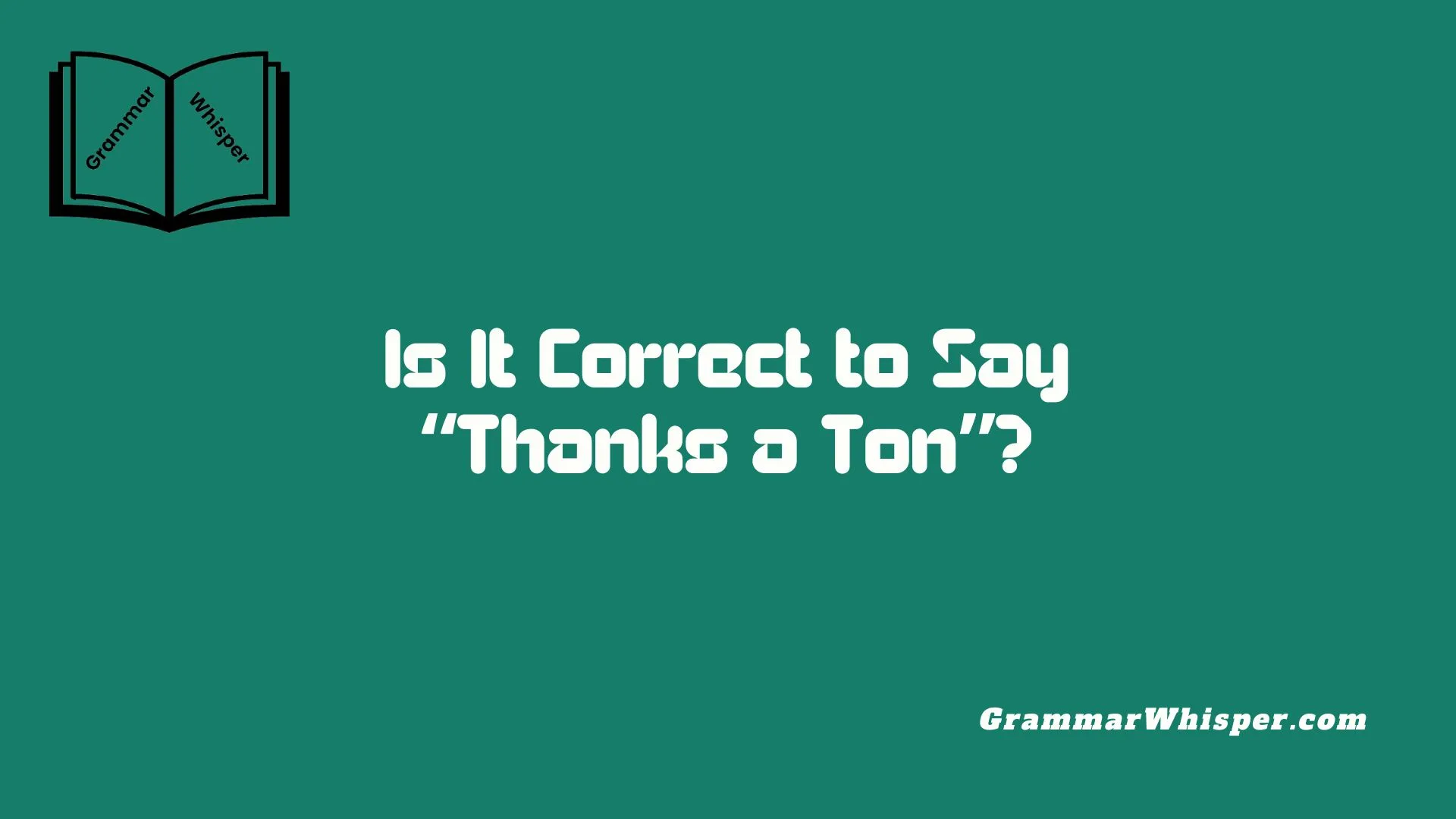When people say thanks a ton, they aren’t estimating weight – they’re expressing big gratitude. This phrase goes back several decades and lives among other common hyperboles we often drop into daily speech. It emphasizes sincerity through a bit of exaggeration, and that’s what gives it such emotional power. I’ve said it to a colleague who stayed late to help wrap up a deadline. Honestly, nothing else would’ve delivered that same mix of warmth and appreciation.
Its casual, yet heartfelt tone makes it stand out. It’s far more emotional than a dry “thanks,” and there’s a subtle charm in that. Just imagine hearing it after a long day – it lands differently. That personal flavor turns simple acknowledgment into something memorable. It shows someone their effort meant something, and that’s powerful.
Literal vs. Figurative Meaning
- Literally, it says “thanks as heavy as a ton” – but we know nobody is counting pounds.
- Figuratively, it means “I’m really grateful,” and conveys emotional weight without the math.
Historical Emergence
The phrase first appeared in informal American English in the early 20th century, influenced by other weight-based expressions like “a ton of fun.” Since then, it naturally fit into everyday conversation, classroom banter, and friendly writing.
Emotional Tone
Using “thanks a ton” softens the phrase, making it feel friendly, warm, and genuine. It’s the gratitude equivalent of offering a virtual hug.
Is “Thanks a Ton” Grammatically and Socially Correct?
From a grammar standpoint, “thanks a ton” is perfectly fine. It fits into everyday English as a shortened, common phrase of appreciation – just like “thanks a lot” or “thanks a bunch.”
Grammatical Integrity
When you say, “Thanks a ton for helping me move,” you’re using “thanks” as a verb, followed by “a ton” describing how big your gratitude is. That’s clear, straightforward, and native.
Situational Appropriateness
| Context | Suitable? | Notes |
| Text to friend | ✅ | Casual tone fits perfectly |
| Thank-you card | ✅ | Friendly if context is informal |
| Email to professor | ⚠️ | Too casual – better to use formal alternatives |
| Business memo | ⚠️ | Skip it unless team culture is very informal |
Cultural Ambiguity
Although widely understood across English-speaking countries, preferences change. British English prefers “thanks a lot,” while Americans often use “thanks a ton.” Know your crowd – and adjust accordingly.
Formal vs Informal Gratitude: Understanding the Divide
Toning your message up or down starts with understanding formality. Misplaced gratitude can feel insincere – or sloppy.
Why Tone Matters
- Overly formal expressions in casual chat can feel stiff
- Too informal phrases in professional settings may undermine your credibility
Informal vs. Formal
- Informal: “Thanks a ton”, “You rock!”, “Big thanks!”
- Formal: “I sincerely appreciate your assistance.”, “Thank you for your support.”
When chatting with a close friend, casual works – professional letters deserve formality.
Cultural and Regional Variations of the Phrase
US vs. UK
- Americans say “thanks a ton” often
- Brits lean toward “thanks ever so much” or “thanks a lot”
Australia & Canada
- Canadians mix both expressions, often casual
- Australians say “thanks heaps”, which is similar in feel
Understanding the Context
In global business or multicultural teams, stick with neutral phrasing like “thank you so much” to avoid cultural confusion.
Common Situations Where “Thanks a Ton” Fits Naturally
Here are everyday cases where “thanks a ton” hits the right note:
Everyday Scenarios
- Text: “Thanks a ton for picking that up!”
- Email to teammate: “Hey Amy, thanks a ton for covering my shift.”
- Casual social media comment: “Thanks a ton for the shout-out!”
Case Studies
- Student group project: a classmate wrote: “Thanks a ton for proofreading my slides!”
- Customer appreciation: “Thanks a ton for shopping local!” – often on handwritten stickers
Failed Usage
- Writing to clients: “Thanks a ton for your order” may sound amateurish. Official invoices need more polished language.
Better Alternatives Based on Context and Audience
Matching tone is about picking the right gratitude. Here’s a quick guide:
Formal Alternatives
- “I sincerely appreciate…”
- “Thank you for your support/assistance.”
- “Your help means a great deal to me.”
Informal Alternatives
- “Thanks so much!”
- “You’re the best!”
- “Thanks a bunch!”
Usage Tips
Use “I greatly appreciate…” in business emails. Use “thanks a ton” with friends.
Psychological Impact of Expressing Gratitude Well
Gratitude strengthens bonds and boosts morale. Studies show that genuine expressions – like “thanks a ton” – increase cooperation and trust.
Trust and Rapport
Casual, heartfelt phrases make people feel personally valued. Saying “thanks a ton” feels like you’re talking to a friend, even on Zoom calls.
Emotional Resonance
When someone offers help, acknowledging effort promptly – with informal warmth – makes them feel seen and appreciated.
Social Psychology Insight
People respond better to emotional, expressive thanks than to formal acknowledgments. Try it next time someone helps you.
Email & Workplace Etiquette: Using Gratitude Expressions Right
Good gratitude can make or break your email’s impact. Here’s what to watch:
Email Templates
- Friendly colleague: “Hey Jane – thanks a ton for sending over those files. It really helped!”
- Manager: “Hi Laura, thank you for tackling that report in short notice. I appreciate your effort.”
HR Guidelines
- Managers are trained to express clear, sincere thanks, but avoid sounding too casual with staff they don’t know well.
Phrases to Avoid
- “Thanks a ton” in formal memos
- Overuse in community forums
- Sarcasm: “Thanks a ton for that genius idea.”
Pop Culture Influence on the Phrase’s Popularity
“Thanks a ton” shows up everywhere – from sitcoms to songs – helping it feel mainstream.
TV and Film
- Sitcoms: common in friendly banter
- Drama: used sincerely to emphasize relief or gratitude
Music & Comedy
- Lyrics and stand-up routines often include it to connect emotionally with the audience.
Media Shift
The phrase’s popularity rose alongside social media – people began using it more in casual digital situations, making it part of modern expression.
Conclusion
Yes – say it confidently in informal settings. Use it with friends, colleagues you know well, and in casual thank-you notes. Pass on it in professional, formal, or cross-cultural contexts – and opt for polished alternatives.
It’s not just about correctness – it’s about choosing tone, audience awareness, and communication style. When you match expression to context, your thanks lands with impact.
FAQs
Is “Thanks a Ton” rude or sarcastic?
Not unless it’s paired with sarcasm. Tone matters. A friendly tone keeps it genuine.
Can I use “Thanks a Ton” in a business email?
Only in casual, familiar work settings. Otherwise go with something more formal.
What’s the difference between “Thanks a Ton” and “Thanks a Bunch”?
They’re similar, but “thanks a bunch” sounds slightly lighter and friendlier.
Is there a formal version of “Thanks a Ton”?
Yes – opt for “I sincerely appreciate your help” or “Thank you very much.”
How do different cultures interpret this phrase?
Americans get it instantly. Brits and Aussies might prefer their own versions – “thanks a lot” or “thanks heaps.”











